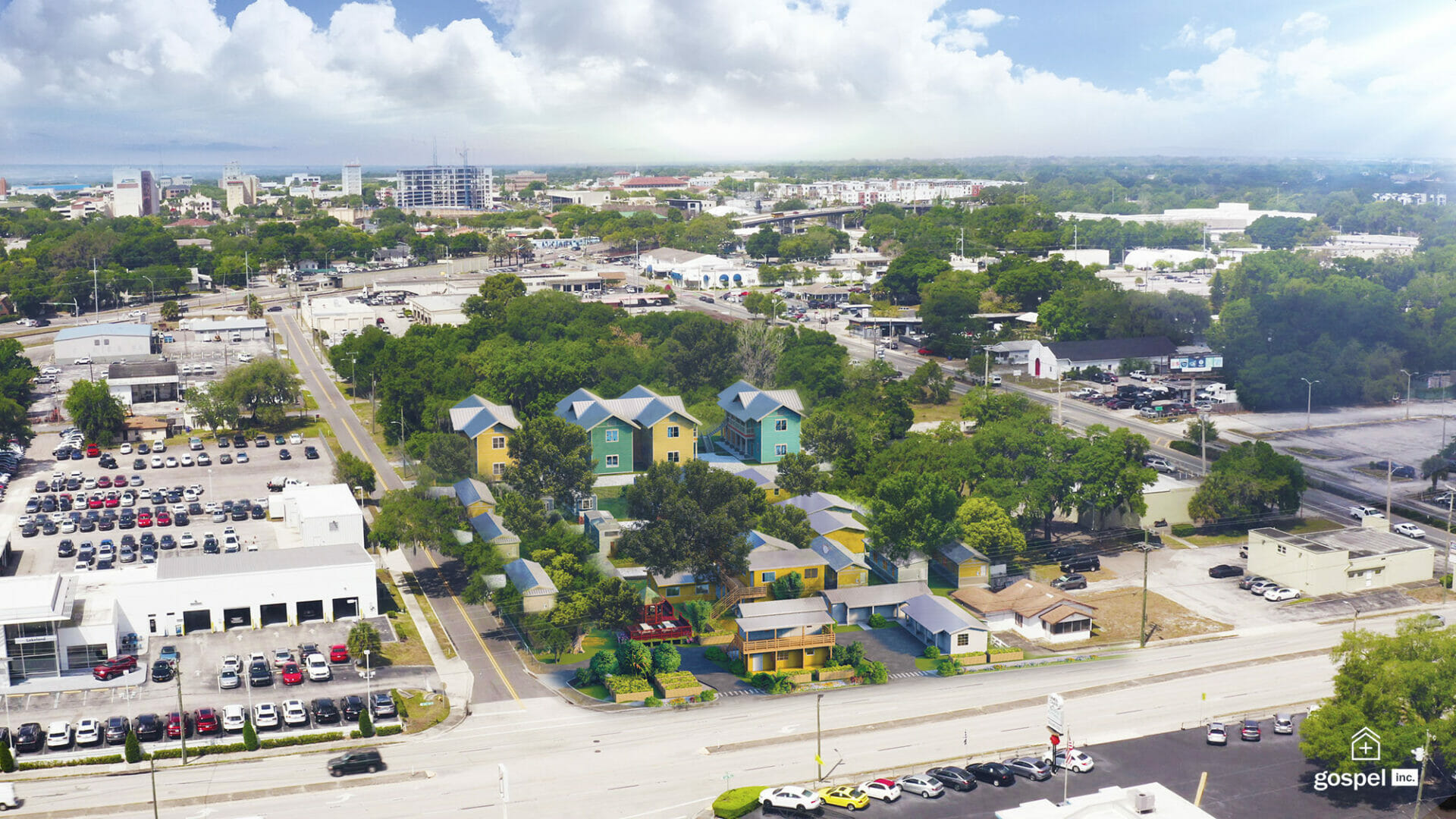Renderings courtesy of The Lunz Group
Gospel, Inc. has been serving the homeless community in Lakeland since 2011. Gospel Village is its latest initiative: a permanent supportive housing program designed to last a lifetime.
To be a “maverick” is to be open-minded and change-focused. Mavericks not only see a city for what it is, but they imagine it for what it could be. Mavericks create meaningful change to benefit everyone, including those normally forgotten and cast aside.
In the nonprofit sector, Brian Seeley, founder of Gospel, Inc., is making a big difference among the homeless population in Lakeland. His most recent endeavor, Gospel Village, will supply a large portion of Lakeland’s low-income folks with a place to call their own.
When Seeley founded Gospel, Inc. in 2011, he sought to stand in solidarity with those experiencing homelessness: a population prevalent in our city, yet overlooked by many. He began with a dream to move Lakeland toward becoming a more inviting and hospitable place for them to thrive.
There are many factors that may inhibit homeless people from finding stable employment. Many have limited work experience, little access to childcare if they need it, and lack of reliable transportation, to name a few. This is why so many people experience perpetual and chronic homelessness. While there are some systems in place to help those without homes temporarily, many of these do not provide the structure necessary to ensure they thrive. The systems created to help them only go so far.

Lakeland architecture firm, The Lunz Group, has been working alongside Gospel, Inc. to render and construct Gospel Village.
Gospel, Inc.’s new housing community, Gospel Village, is dedicated to maintaining permanent supportive housing. Seeley in particular is not interested in any kind of transitional housing or a temporary place to crash. Gospel Village is unfolding so that, “They never have to move. This is their home,” says Seeley. It will be a community that provides lifelong support to those in need.
Gospel, Inc. was recently provided a million-dollar community development block grant administered through the Polk County housing and neighborhood development. The overall goal is to expand to accommodate the entire population. “Eventually, we want to build enough homes to serve every chronically homeless person in our city,” says Seeley. “The village, though, is a pretty good start.”

Permanent supportive housing is one of many ways Gospel, Inc. assists the homeless population. To get involved in one of its various initiatives, visit gospelinc.org.
Seeley is passionate about community. Community gives us purpose: the people surrounding us remind us that we are capable and valued. This is true of a person who finds himself or herself to be in a cycle of homelessness for years, too. This is why it is so important for them to be in a supportive environment when setting out on a journey toward employment and sustained living.
The vision behind Gospel Village is to provide not only housing and shelter, but an opportunity to work and contribute to the village as a whole. Volunteers work alongside Farmer Will and Robyn Wilson to create a village garden, so residents can harvest and compost their own food. Gospel, Inc. operates an art studio to assist women and get them connected to others in the city. In addition to the micro farm, there will be a food forest, chicken coop, and community refrigerator.
Gospel Village would not exist without community support. Organizations like Trinity Presbyterian Church, the Polk County Board of Commissioners, and Grace City have shown up to support through manual labor and strategic planning. Jenna O’Brien of Twenty Seven is creating a mural. The Lunz Group is assisting with renderings and building plans.
Gospel Village is proof that, when the residents of our city band together on common ground, we can see exponential growth. All our skill sets may work together toward a universal good in providing for those lacking resources, support, and basic care.
